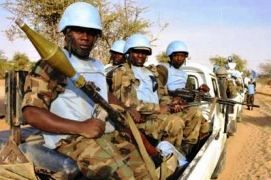US to help equip Rwandans for Darfur peacekeeping
May 8, 2008 (UNITED NATIONS) — The United States is helping to equip Rwandan troops who will be heading to Darfur and is trying to find helicopters for the peacekeeping force in the conflict-wracked region, the U.S. special envoy to Sudan said Wednesday.

There are currently four Rwandan battalions with about 2,700 troops in Darfur, and the soldiers being equipped and trained by the U.S. will replace many of them as they complete their tour of duty in the coming months, the U.N. said. When the Rwandan troop contingent is fully deployed, it will have four larger battalions with about 3,200 troops.
U.S. Ambassador Richard Williamson, who took over in January as President George W. Bush’s special envoy, said about 900 Rwandan troops will be trained, equipped and ready to deploy in June and another 1,600 by August.
“We’re providing training as well as equipment as part of President Bush’s US$100 million commitment to help prepare African peacekeepers,” he said.
It is unclear, however, when the Rwandan peacekeepers will actually arrive in Darfur.
Rodolphe Adada, the envoy for the AU-U.N. force known as UNAMID, said last month that the joint mission faces major problems in putting troops into a very hostile environment. It still lacks five critical capabilities to become operational attack helicopters, surveillance aircraft, transport helicopters, military engineers and logistical support.
Williamson said U.S. Defense Department were at U.N. headquarters Wednesday working with the U.N. to try to solve the helicopter needs.
In late March, Williamson urged the United Nations to get 3,600 new peacekeepers on the ground in Darfur by June, saying additional troops are the best hope of increasing security.
“Our difficulty is that the U.N. does not yet have the capacity to accept them,” he said in a telephone interview on Wednesday.
Williamson said the United States appreciates statements by Secretary-General Ban Ki-moon, Assistant Secretary-General Jane Holl Lute, and Adada that the U.N. will be able to get 80 percent of the authorized force into Darfur by the end of the year and looks forward to hearing details of future deployments.
“We think it’s absolutely necessary to get boots on the ground and we think it’s possible,” Williamson said, adding that Bush and Ban discussed the issue within the last week.
Adada has said the first new battalions for Darfur from Egypt and Ethiopia are expected to arrive in June. Each will have 800 troops.
Rwanda’s U.N. Ambassador Joseph Nsengimana said the U.S. help will enable its troops to fully deploy.
“We need a lot of equipment and the United States has accepted to give it to complete four battalions,” he said.
“Rwanda is really commited for helping peacekeeping, mainly (because) we suffered from non-participation no help in the 1994 genocide,” Nsengimana said. “The consequence has been that we want to help all people who are suffering, and it is the commitment of the government of Rwanda.”
The Darfur conflict began in early 2003 when ethnic African rebels took up arms against Sudan’s Arab-dominated central government, accusing it of discrimination. Many of the worst atrocities in the war have been blamed on the janjaweed militia of Arab nomads allied with the government. The U.N. says 2.5 million people have been forced from their homes and the death toll from the more than five-year conflict could be 300,000.
Ban, the U.N. secretary-general, expressed concern Wednesday at increasing acts of banditry and deplored recent bombings of a school, water installations and a market in North Darfur, U.N. deputy spokeswoman Marie Okabe said.
“The secretary-general reiterates his call for all parties to urgently cease hostilities, ensure the protection of civilians and to work with UNAMID to promote security and commit to the political process being led by the special envoys of the United Nations and African Union,” she said.
(AP)
